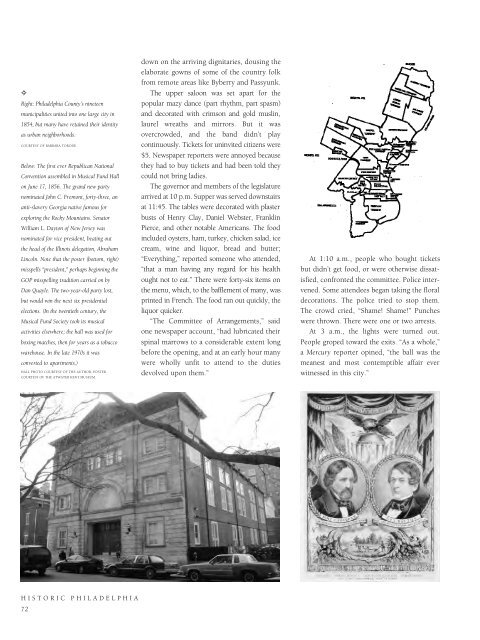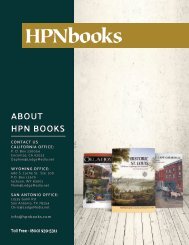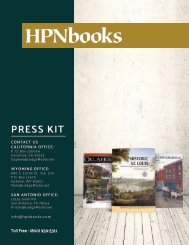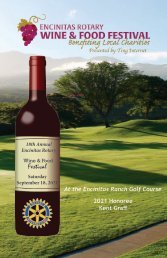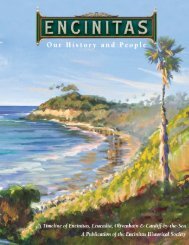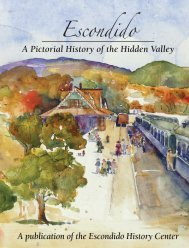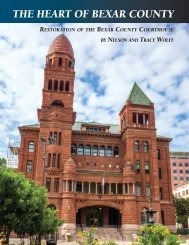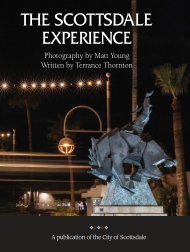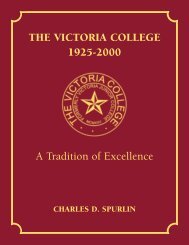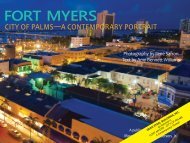Historic Philadelphia
An illustrated history of the city of Philadelphia, paired with the histories of companies, families and organizations that make the region great.
An illustrated history of the city of Philadelphia, paired with the histories of companies, families and organizations that make the region great.
You also want an ePaper? Increase the reach of your titles
YUMPU automatically turns print PDFs into web optimized ePapers that Google loves.
✧<br />
Right: <strong>Philadelphia</strong> County’s nineteen<br />
municipalities united into one large city in<br />
1854, but many have retained their identity<br />
as urban neighborhoods.<br />
COURTESY OF BARBARA TORODE.<br />
Below: The first ever Republican National<br />
Convention assembled in Musical Fund Hall<br />
on June 17, 1856. The grand new party<br />
nominated John C. Fremont, forty-three, an<br />
anti-slavery Georgia native famous for<br />
exploring the Rocky Mountains. Senator<br />
William L. Dayton of New Jersey was<br />
nominated for vice president, beating out<br />
the head of the Illinois delegation, Abraham<br />
Lincoln. Note that the poster (bottom, right)<br />
misspells “president,” perhaps beginning the<br />
GOP misspelling tradition carried on by<br />
Dan Quayle. The two-year-old party lost,<br />
but would win the next six presidential<br />
elections. (In the twentieth century, the<br />
Musical Fund Society took its musical<br />
activities elsewhere; the hall was used for<br />
boxing matches, then for years as a tobacco<br />
warehouse. In the late 1970s it was<br />
converted to apartments.)<br />
HALL PHOTO COURTESY OF THE AUTHOR. POSTER<br />
COURTESY OF THE ATWATER KENT MUSEUM.<br />
down on the arriving dignitaries, dousing the<br />
elaborate gowns of some of the country folk<br />
from remote areas like Byberry and Passyunk.<br />
The upper saloon was set apart for the<br />
popular mazy dance (part rhythm, part spasm)<br />
and decorated with crimson and gold muslin,<br />
laurel wreaths and mirrors. But it was<br />
overcrowded, and the band didn’t play<br />
continuously. Tickets for uninvited citizens were<br />
$5. Newspaper reporters were annoyed because<br />
they had to buy tickets and had been told they<br />
could not bring ladies.<br />
The governor and members of the legislature<br />
arrived at 10 p.m. Supper was served downstairs<br />
at 11:45. The tables were decorated with plaster<br />
busts of Henry Clay, Daniel Webster, Franklin<br />
Pierce, and other notable Americans. The food<br />
included oysters, ham, turkey, chicken salad, ice<br />
cream, wine and liquor, bread and butter;<br />
“Everything,” reported someone who attended,<br />
“that a man having any regard for his health<br />
ought not to eat.” There were forty-six items on<br />
the menu, which, to the bafflement of many, was<br />
printed in French. The food ran out quickly, the<br />
liquor quicker.<br />
“The Committee of Arrangements,” said<br />
one newspaper account, “had lubricated their<br />
spinal marrows to a considerable extent long<br />
before the opening, and at an early hour many<br />
were wholly unfit to attend to the duties<br />
devolved upon them.”<br />
At 1:10 a.m., people who bought tickets<br />
but didn’t get food, or were otherwise dissatisfied,<br />
confronted the committee. Police intervened.<br />
Some attendees began taking the floral<br />
decorations. The police tried to stop them.<br />
The crowd cried, “Shame! Shame!” Punches<br />
were thrown. There were one or two arrests.<br />
At 3 a.m., the lights were turned out.<br />
People groped toward the exits. “As a whole,”<br />
a Mercury reporter opined, “the ball was the<br />
meanest and most contemptible affair ever<br />
witnessed in this city.”<br />
HISTORIC PHILADELPHIA<br />
72


